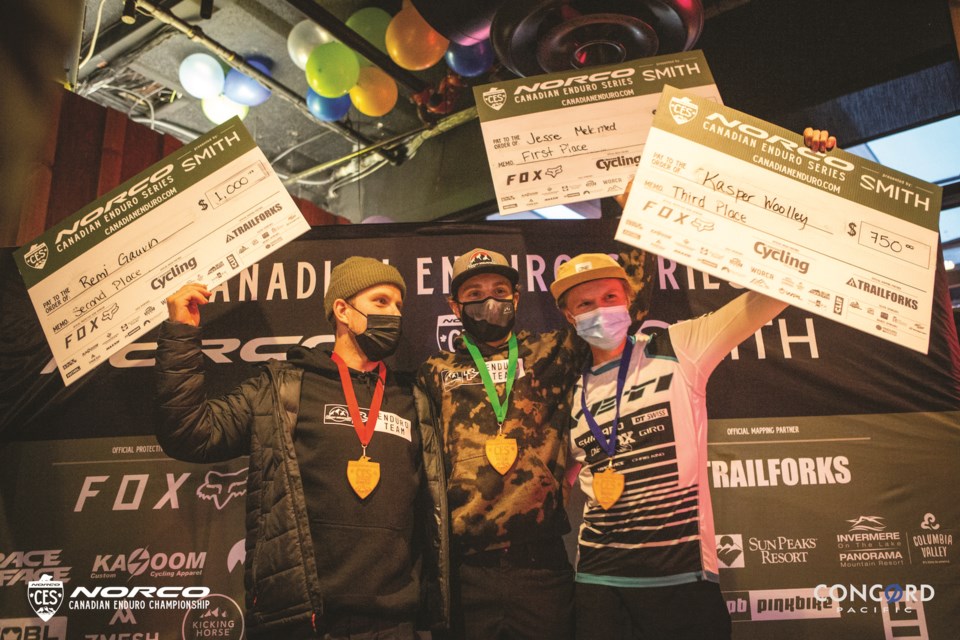Racing on his home turf after months in Europe where he finished third overall in the Enduro World Series, Jesse Melamed captured his first win of the season at the Canadian Enduro Championships (CEC), securing the title of national champion.
“It does feel good because I’ve been injured in the past, so I’ve never been able to actually compete for the national champs. So there is that pride being able to wear that sleeve and be crowned the national champ even though I’ve been the No. 1 ranked Canadian in the World Series for a while,” said Melamed. “But this really feels like I have something to put on my resume and be able to say I’m the Canadian National Champion.”
But despite Melamed finally getting that elusive first place finish—after a handful of top-five finishes at the Enduro World Series (EWS)—and doing so with a whopping, 44-second lead, this course was no joke according to he and CEC founder Ted Morton.
“This is probably one of the hardest races ever … it’s at the end of the season so mentally a lot of the racers are burnt out and then physically it’s a lot of pedalling and the weather made the descents also quite technical as well, so I think it was a great event,” said Morton.
“Anybody who finished the race should be proud because it was a mega, mega day. If a racer is discouraged because of how hard that race is, I would say ‘yeah good, you should be discouraged because that was probably the hardest race that I ever put on, physically and probably mentally because of the weather,’ so yeah it is tough but it’s the national championship. In five years when the race is still happening and it’s in Whistler, people are going to remember this year.”
But for Melamed, regardless of the poor weather and challenging nature of the course that left him both physically and mentally exhausted at the end of the more than 50-kilometre race, the format of the race and being able to compete in front of family and friends kept the day interesting and gave him some more motivation.
In the EWS, each rider has specific start times at each stage of the race they need to adhere to, which makes the day very long and often lonely, according to Melamed. But at the CEC, with no specific start times, the racers were allowed to drop into each stage whenever they wanted so instead of finishing a stage and moving on to the next immediately, the racers would regroup at the bottom and make their way to the following stages together.
“[In EWS] we have 30-second gaps between everybody, so you don’t always regroup and pedal together because you are kind of nervous about making your start time for the next stage,” he said. “So that’s what I mean—these races are really fun because we have kind of the core group of the Pro Men’s, so we get to the stage and we can start whenever we want so there’s just seven or eight of us riding around all day and that really helps keep the morale high and gets us all through the race.”
Rounding out the rest of the pro category winners were Remi Gauvin and Kasper Woolley who finished second and third in the Pro Men’s category while Andréane Lanthier Nadeau took the gold in the Women’s Pro with Julia Long and Florencia Espineira taking home silver and bronze, respectively.
But the event didn’t only cater to the professional riders, as there were 241 riders across 19 categories competing in the CEC ranging in age from under 15 to over 50.
Some notable performances from the amateur and expert categories include Whistler’s Braden Aitken and Squamish’s Jacob Quist who finished one and two in the 15 and Under category, Whistler’s Wei Tien Ho who took silver in the U21 category and Whistler Off-Road Cycling Association president Dale Mikkelsen who finished fourth in the Men’s 40 to 49 category.
Among the 241 racers competing, there were 20 U21 athletes that were able to compete in the event thanks to a never-before-done collaborative initiative between the CEC, title sponsor Concord Pacific and Whistler Community Services Society (WCSS), which paid the entry fees for applicants who met the financial need criteria.
“The idea here was to reduce barriers to competitive sport for young aspiring athletes,” said Morton. “I recognize that competitive sport, and mountain biking in particular, is quite expensive, and the goal has always been how can we get the best level of competition in Canada? So luckily WCSS jumped onboard to help administor a program where athletes could apply, and Concord Pacific came in to pay those entries for those athletes. So super cool and absolutely unheard of in the sport.
“I think reducing barriers to entry, elevating the level of competition and ensuring there is a certain amount of accessibility into sport is paramount. We are the national series and it’s our duty to make sure that the next generation is better and faster than the current generation. That’s always the goal, so this gives them equal opportunity to showcase their talent and compete at the highest level in Canada.”




